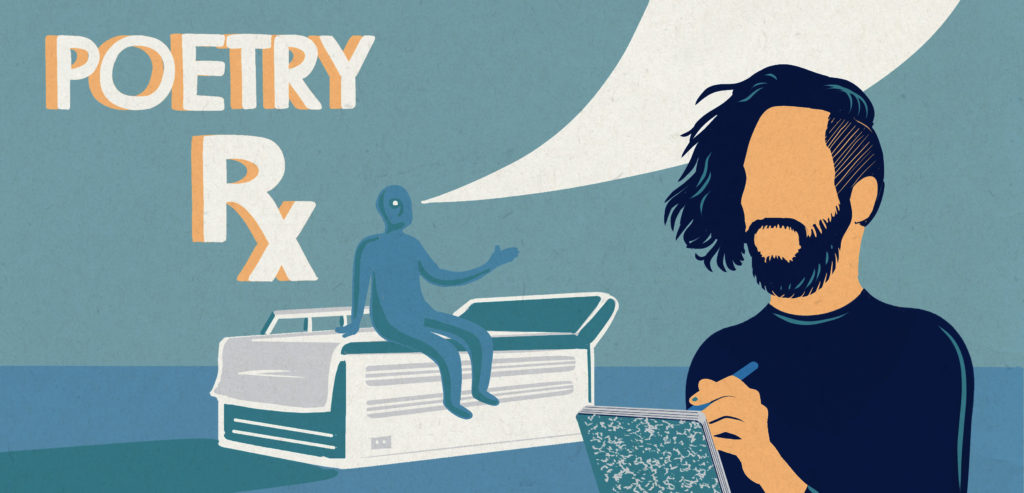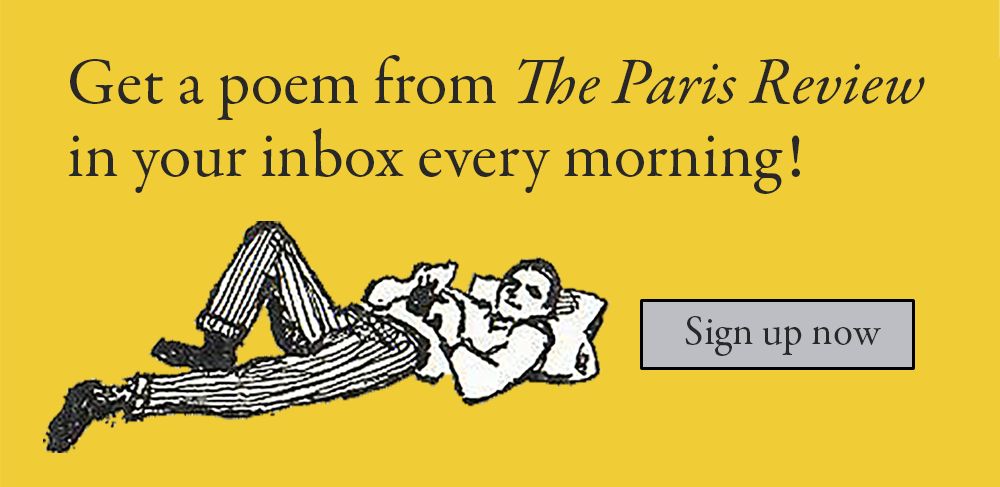In our column Poetry Rx, readers write in with a specific emotion, and our resident poets—Sarah Kay, Kaveh Akbar, and Claire Schwartz—take turns prescribing the perfect poems to match. This week, Kaveh Akbar is on the line.
Hi Poets,
My husband and I decided to be friends instead of married a week ago, and although I’m confident it’s the right decision, and am mostly cheerful, I am also having brief flashes of terror about, you know, Tinder, and having to decide on what to do with an entire Sunday on my own or what I really want for lunch, for just me.
Do you have any hopeful poems about the beginnings of things, or what makes a person and how to find it out? I would like to hear them if you did.
Yours,
Hopeful
Dear Hopeful,
A million poems flashed through my head to give you—poems about terror, poems about divorce, poems about Tinder. But ultimately, the poem I most want to give you is just a little one, ten words, about radishes. It’s by Kobayashi Issa, translated by Robert Hass, and is too short to excerpt, so please click here to read it.
Our lives are what we fill them with. If a radish fills up your hand, you might use it to point the way. If your hand is holding your husband’s, you might find yourself using his, not yours, to guide you. Now that your hands are free again, it is thrilling to think about all the things you might fill them with—a phone full of strange new dating apps, or a gyro from the sandwich place you never got to go to because your husband hated it. Be gentle with yourself, and patient. Remember there is no wrong way to start over. Your own left hand fits perfectly into your right.
–KA
*
Dear Poets,
I’d love a prescription for poetry about or involving video games! Hope you can help!
Thanks,
Gamer
Dear Gamer,
Someone should make an anthology of great gaming poems—mine would include “Sonic & Knuckles” by Cortney Lamar Charleston, “There is a Forward Motion in Old Video Games” by P. Scott Cunningham, and “‘Rattata’ & ‘Cubone’” by Colette Arrand. It would also include the poem I’m prescribing you here, a poem about one of my favorite games ever: “Oregon Trail,” by Nate Marshall.
i aimed my rifle with the arrow keys, tapped the spacebar with a prayer for meat to haul back to the wagon.this game came difficult as breathing underwater aftertrying to ford a river.i was no good at survival.somebody always fell ill or out into the river.
The poem gets everything about the game right—unforgiving difficulty, constant waffling between “ammo & axles,” the perpetual compulsion to name characters after crushes and siblings. But halfway through his lines, Marshall turns us away from the screen—the deaths move from pixels to people. The speaker seems as shocked by this as we are, writing “the expansive obit in a suburban / Detroit church is a confusing newness.” With rending clarity, we see a man desperately trying to turn away, to “retreat into [his] former self.” But real life makes no such allowances, and the poem ends wanting for what our worlds (real or virtual) never seem to give us: “the game won, the west / conquered.”
–KA
*
Dear Poets,
I don’t know what I’m doing with my life. To outside observers, I look like I have everything together—I’m a 1L at a good law school, I have leadership positions in different clubs, and I have plenty of friends. However, I lie awake at night consumed by anxiety that I am not choosing the right path. I am torn between pleasing my family and my friends and chasing dreams I’ve harbored since childhood, ones I have always sidelined in favor of the “appropriate.” I am in the midst of an existential crisis and am completely unmoored from myself. Please send me a rudder.
XO,
Wandering Without A Map
Dear Wandering,
But you do have a map! And it’s yours to erase and draw all over and spill coffee on and paint green. Vijay Seshadri talks about poetry as being a site for unprecedented experience, and your singular experience of life on the planet earth is yours alone to author. For you, I prescribe “The Summer Day” by Mary Oliver.
The poem begins by asking, “Who made the world?” It’s a more complicated question than it seems. As someone who spent my childhood and teens building toward an “appropriate” career path in the hard sciences, only to clumsily stumble off into poetry, I’m here on the other side to tell you: the water’s warm! The pivot was painful, it was inelegant, it was long. It also lead me to a life in which I wake up every day and spend all my time in reading, writing, talking about my very favorite thing. And now that I have health insurance, even my family has come around! As Oliver writes:
Tell me, what else should I have done?
Doesn’t everything die at last, and too soon?
Tell me, what is it you plan to do
with your one wild and precious life?
I wake up every day astonished and grateful. Of course, I still get sad, lonely, and scared, too (“Doesn’t everything die at last, and too soon?”). But at the end of my journey, when someone asks me what I did with my “one wild and precious life,” it is my desperate hope that I will be able to answer that I served what I loved best. I hope you find what you love best and get to spend your days joyfully serving it as well.
–KA
Want more? Read earlier installments of Poetry Rx. Need a poem? Write to us! Next week, Sarah Kay will be answering questions.
Kaveh Akbar’s poems have appeared recently in The New Yorker, Poetry, the New York Times, the Nation, and elsewhere. His first book is Calling a Wolf a Wolf. Born in Tehran, Iran, he teaches at Purdue University and in the low-residency M.F.A. programs at Randolph College and Warren Wilson.
from The Paris Review https://ift.tt/2SfiY66


Comments
Post a Comment